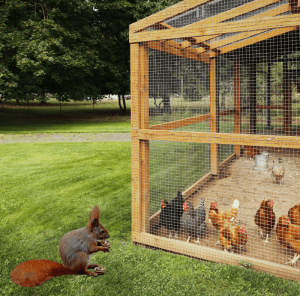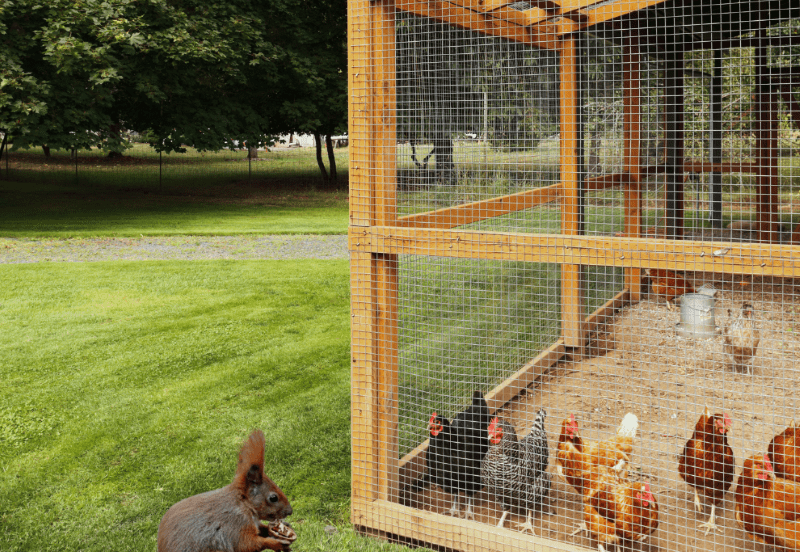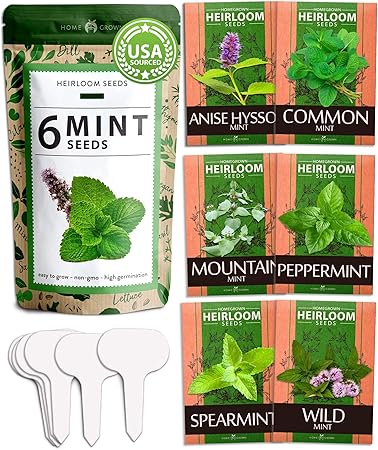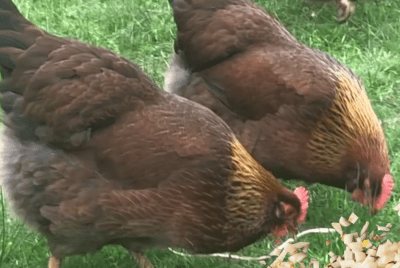Squirrel-proofing Your Chicken Coop
Squirrel-proofing Your Chicken Coop: it’s no secret that squirrels can wreak havoc on a chicken coop, causing damage and stress to your feathered friends. In this blog post, we’ll explore effective methods and strategies to keep those pesky squirrels at bay and protect your chickens. Let’s get started on creating a squirrel-proof haven for your chickens!
Key Takeaways:
- Secure the Feed: Keep chicken feed stored in secure containers that squirrels can’t access.
- Protect the Coop: Use hardware cloth to cover any openings in the coop where squirrels could enter.
- Install Motion-Activated Devices: Set up motion-activated sprinklers or sound devices to deter squirrels from approaching the coop.
- Trim Tree Branches: Keep tree branches trimmed back to prevent squirrels from accessing the coop from above.
- Remove Attractants: Make sure to clean up any spilled feed or water around the coop to eliminate attractions for squirrels.
Understanding Squirrel Behavior
Common Squirrel Habits
An imperative step in squirrel-proofing your chicken coop is understanding these furry little intruders. Squirrels are known for their agility, intelligence, and determination. They are expert climbers, jumpers, and diggers, capable of finding their way into seemingly secure spaces. Squirrels are diurnal creatures, most active during the day, seeking food and shelter.
Why Squirrels are Attracted to Chicken Coops
Common reasons why squirrels are attracted to chicken coops include the presence of food, warmth, and shelter. Your chicken feed, grains, and even eggs can be irresistible treats for these critters. Moreover, the cozy environment of a chicken coop offers a safe haven for squirrels to nest and raise their young. In their quest for food and shelter, they can cause damage by gnawing on wood, wires, and insulation.
Squirrels are opportunistic animals that can gnaw through almost anything, posing a threat to your chickens and the structural integrity of your coop. Their gnawing can lead to electrical hazards, fires, and compromised security. It’s crucial to take proactive measures to keep these curious creatures at bay.
Physical Barrier Solutions to Squirrel-proofing Your Chicken Coop
Reinforcing Your Coop Structure
Clearly, one of the first steps in squirrel-proofing your chicken coop is reinforcing the structure itself. To protect your precious flock, make sure to inspect the coop for any potential entry points such as gaps, holes, or weak spots. Use sturdy materials like hardware cloth or galvanized steel to reinforce areas where squirrels could potentially chew through.
Secure Fencing and Roofing Techniques
Roofing, when it comes to keeping squirrels out of your coop, a strong and secure fence is necessary. Opt for wire fencing with small openings that squirrels cannot squeeze through. Additionally, consider adding an overhang to the top of the fence to prevent squirrels from climbing over. Ensure the roofing of your coop is also secure and lacks any gaps where squirrels can enter.
Solutions: It’s important to remember that squirrels are excellent climbers and jumpers, so make sure your fencing is at least 6 feet high and extends a few inches underground to prevent burrowing. Trim tree branches that hang over the coop to eliminate potential squirrel highways. By focusing on these key areas, you can create a secure environment for your chickens, free from squirrel disturbances.
Deterrents and Repellents
Natural Squirrel Repellents
Many chicken owners prefer to use natural squirrel repellents to keep these furry intruders at bay. Options such as cayenne pepper, garlic, vinegar, Vicks Vapo Rub or predator urine can be effective in deterring squirrels without harming them or your chickens. Simply sprinkle these natural ingredients around the coop or place them strategically to create a barrier that squirrels will want to avoid.
Many gardeners use mothballs effectively to deter squirrels. Placing them in a perforated, covered container allows the strong odor to repel squirrels without crossing their path directly. This method also ensures the mothballs pose no threat to other garden life.
They don’t like humans or human hair. So everytime you clean your hairbrush or comb, insttead of emptying the hair in the bin put it around your coop how ever you see fit.
Technological Aids to Keep Squirrels at Bay
Any savvy chicken owner knows that sometimes a little technology can go a long way in keeping squirrels away from the coop. There are various technological aids available, such as motion-activated sprinklers, ultrasonic repellent devices, or even specially designed feeders that close when a squirrel tries to access them. These tools can help you protect your chicken coop without causing any harm to the squirrels.
Squirrels are agile and determined critters that can cause a lot of trouble for your chickens if they manage to invade the coop. They are known for their persistence in finding ways to access food sources, making it crucial to find effective ways to deter them.
Technological aids can be a game-changer when it comes to keeping squirrels away from your chicken coop. Investing in these advanced devices can provide an extra layer of protection for your feathered friends, giving you peace of mind knowing that your coop is safeguarded against squirrel intrusions.
Maintaining Your Squirrel-Proof Coop
Regular Inspections and Upkeep
One of the key aspects of keeping your chicken coop squirrel-proof is to conduct regular inspections and upkeep. This involves checking for any signs of wear and tear on the coop structure, making sure all entry points are securely sealed, and removing any potential nesting materials that squirrels might use to gain entry. By staying on top of these tasks, you can ensure that your coop remains squirrel-free and your chickens stay safe and secure.
When to Update or Upgrade Your Defenses
Your squirrel-proof defenses may need updating or upgrading from time to time. One key indicator is if you start noticing signs of squirrel activity near your coop, such as chew marks on wood or signs of digging. It’s also a good idea to reassess your defenses if you’ve had a recent squirrel intrusion or if you’ve made changes to your coop that could potentially create new entry points for squirrels.
Upkeep: It’s crucial to stay proactive when it comes to maintaining your squirrel-proof coop. Regular inspections and immediate repairs can prevent potential squirrel intrusions, keeping your chickens safe. Do not forget, an ounce of prevention is worth a pound of cure!
If you’re dealing with squirrels invading your garden, there are several plants that they tend to avoid. Here’s a list of plants that squirrels typically dislike:
Strong-Scented Herbs
- Peppermint: The strong minty scent is overwhelming for squirrels.
- Rosemary: Its potent aroma is a natural deterrent.
- Oregano: The strong smell can keep squirrels away.
Flowering Plants
- Daffodils: Squirrels tend to stay clear of these toxic flowers.
- Alliums: The onion-like smell of these plants repels squirrels.
- Galanthus (Snowdrops): Another bulb that squirrels usually avoid due to its bitter taste.
Bulb Plants
- Hyacinths: The strong fragrance and taste make them unappealing to squirrels.
- Fritillaries: These bulbs have a musky scent that squirrels don’t like.
Vegetables
- Onions: The pungent smell is often enough to keep squirrels at bay.
- Garlic: Squirrels dislike the strong aroma and taste of garlic.
Shrubs
- Spiky Barberry: The thorns and bitter taste deter squirrels from munching on this shrub.
- Juniper: Its sharp needles and strong scent are unappealing to squirrels.
Trees
- Ginkgo (Ginkgo biloba): Squirrels tend to avoid ginkgo trees, likely due to the smell of the fruits.
Planting these around your garden or near vulnerable areas can help reduce the presence of squirrels, giving your plants a better chance to thrive.
To wrap up about Squirrel Proofing your Chicken Coop
Ultimately, squirrel-proofing your chicken coop is crucial to protect your feathered friends from these mischievous creatures. By following the tips and tricks outlined in this article, such as securing feed, sealing entry points, and using deterrents, you can help keep squirrels at bay and ensure a safe and secure environment for your chickens. Keep in mind, prevention is key in keeping your coop squirrel-free, so be proactive in implementing these measures. With a little effort and creativity, you can create a squirrel-proof space that will keep your chickens happy and healthy. Happy squirrel-proofing!

FAQ’s on Squirrel Proofing your Chicken Coop
Q: Why is squirrel-proofing important for a chicken coop?
A: Squirrels can raid chicken feed, chew on wires, and cause damage to your coop. Squirrel-proofing helps protect your chickens and coop from potential harm.
Q: How can I squirrel-proof my chicken coop?
A: To squirrel-proof your chicken coop, make sure all food is securely stored, seal any openings or gaps in the coop, and consider installing barriers like wire mesh or baffles. Some people use Vicks vapo rub.
Q: What are some signs that squirrels are getting into my chicken coop?
A: Signs of squirrels in your chicken coop include chewed feed bags, droppings, damage to wires or insulation, and missing eggs or feed.
Q: Are there any natural deterrents to keep squirrels away from my coop?
A: Yes, planting mint, garlic, or lavender around your coop can help deter squirrels. You can also use citrus peels or cayenne pepper as natural repellents. Mothballs in a perforated covered container works well most squirrels will not cross the path of a moth ball.
Q: How often should I check for squirrel activity in my chicken coop?
A: It’s a good idea to check for squirrel activity regularly, especially in the fall when they are looking for food sources for winter. Stay vigilant to prevent any damage to your coop.
Here are some other posts you might like:














